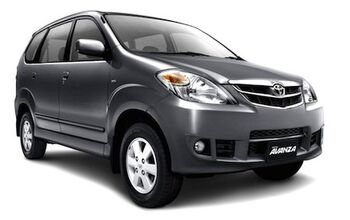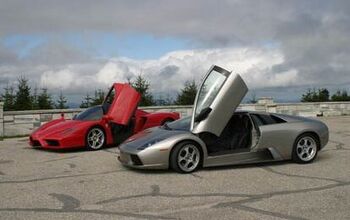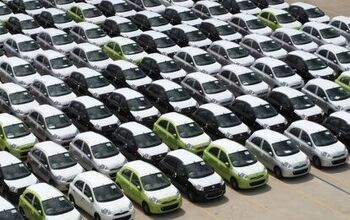And Now, Indonesia

When people talk about red hot car markets, the usually mean BRIC: Brazil, Russia, India, China. Nobody ever mentions Indonesia. Indonesia? That island nation has some 235m people, three quarters the population of the U.S.A. But it’s very under-motorized. Last year, Indonesians bought only 486,000 cars, 20 percent less than in the year before. Indonesia’s car production is not much to write home about either. According to OICA, Indonesia produced 464,816 motor vehicles last year. In 2005, they made 500,710. So let’s forget about them, right? Not so fast.
The Indonesian government wants to revive production in their country. According to The Nikkei [sub], “Indonesia is expected to grow quickly in the next several years as the government is preparing a tax incentive and manufacturers are raising output capacity.”
Currently, the government charges a 10 to 30 percent tax, not when the car is sold, already when automakers sell vehicles to dealers. According to new plans, that tax will be greatly reduced for small cars, likely with engines of a liter or less, and costing below 100 million rupiah (11,200 dollars).
As a reaction, Indonesian makers are beefing up capacity.
- PT Astra International, Indonesia’s largest carmaker, plans to raise capacity at its joint-venture factory with Toyota to 150,000 units a year. Astra International also wants to boost annual capacity to 280,000 units at its joint-venture with Toyota’s Daihatsu.
- PT Indomobil Sukses will double the capacity of its joint-venture plant with Nissan to 100,000 vehicles a year. Their joint venture with Toyota’s Hino will build a factory able to turn out 25,000 small trucks annually. Indomobil will also increase the number of models it produces for Volkswagen AG.
And they are not sitting on their hands. The Association of Indonesia Automotive Industries predicts that automobile sales in Indonesia will hit a record 700,000 units in 2010, and that production will total about 620,000 units. As a start.
Now check the involved joint venture brands and tell me: Who’s missing out on the bonanza-in-the-making? It’s not just Indonesia. All ASEAN markets are waking up, as the picture illustrates.

Bertel Schmitt comes back to journalism after taking a 35 year break in advertising and marketing. He ran and owned advertising agencies in Duesseldorf, Germany, and New York City. Volkswagen A.G. was Bertel's most important corporate account. Schmitt's advertising and marketing career touched many corners of the industry with a special focus on automotive products and services. Since 2004, he lives in Japan and China with his wife <a href="http://www.tomokoandbertel.com"> Tomoko </a>. Bertel Schmitt is a founding board member of the <a href="http://www.offshoresuperseries.com"> Offshore Super Series </a>, an American offshore powerboat racing organization. He is co-owner of the racing team Typhoon.
More by Bertel Schmitt
Latest Car Reviews
Read moreLatest Product Reviews
Read moreRecent Comments
- Honda1 Unions were needed back in the early days, not needed know. There are plenty of rules and regulations and government agencies that keep companies in line. It's just a money grad and nothing more. Fain is a punk!
- 1995 SC If the necessary number of employees vote to unionize then yes, they should be unionized. That's how it works.
- Sobhuza Trooper That Dave Thomas fella sounds like the kind of twit who is oh-so-quick to tell us how easy and fun the bus is for any and all of your personal transportation needs. The time to get to and from the bus stop is never a concern. The time waiting for the bus is never a concern. The time waiting for a connection (if there is one) is never a concern. The weather is never a concern. Whatever you might be carrying or intend to purchase is never a concern. Nope, Boo Cars! Yeah Buses! Buses rule!Needless to say, these twits don't actual take the damn bus.
- MaintenanceCosts Nobody here seems to acknowledge that there are multiple use cases for cars.Some people spend all their time driving all over the country and need every mile and minute of time savings. ICE cars are better for them right now.Some people only drive locally and fly when they travel. For them, there's probably a range number that works, and they don't really need more. For the uses for which we use our EV, that would be around 150 miles. The other thing about a low range requirement is it can make 120V charging viable. If you don't drive more than an average of about 40 miles/day, you can probably get enough electrons through a wall outlet. We spent over two years charging our Bolt only through 120V, while our house was getting rebuilt, and never had an issue.Those are extremes. There are all sorts of use cases in between, which probably represent the majority of drivers. For some users, what's needed is more range. But I think for most users, what's needed is better charging. Retrofit apartment garages like Tim's with 240V outlets at every spot. Install more L3 chargers in supermarket parking lots and alongside gas stations. Make chargers that work like Tesla Superchargers as ubiquitous as gas stations, and EV charging will not be an issue for most users.
- MaintenanceCosts I don't have an opinion on whether any one plant unionizing is the right answer, but the employees sure need to have the right to organize. Unions or the credible threat of unionization are the only thing, history has proven, that can keep employers honest. Without it, we've seen over and over, the employers have complete power over the workers and feel free to exploit the workers however they see fit. (And don't tell me "oh, the workers can just leave" - in an oligopolistic industry, working conditions quickly converge, and there's not another employer right around the corner.)
































Comments
Join the conversation
If you are going to use tired American cliches can you at least modernize it to..."email home about"? Im sure that putting a letter in the mail in Indonesia would take months to deliver anyway.
Apparently missing are Ford, GM and Chrysler-Fiat.